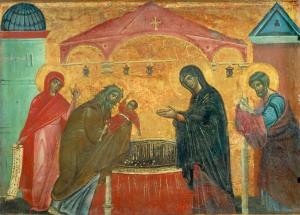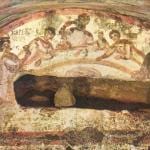
The Temple in Jerusalem holds an important role in salvation history. Those who came to it could experience the presence of God. If they went with the right attitude and spiritual condition, their encounter with God could leave them changed for the better. However, if they there haughty and full of pride, they risked being turned away from God until they had a change of heart. There was, therefore, the possibility of an authentic encounter with God in the Temple. As with all encounters with God, there was always a risk as to the kind of response God would give. He would reveal to the person their inner spirit.
Jesus confirmed the value of the Temple, and indeed, the presence of God in the Temple with his own earthly life. He went there several times. Each time, he became the personal face of God to those who were at the Temple, transforming their encounter with God from that of an impersonal presence to an encounter with him. But he also did the same for the Temple as well. Through him, through his visits at the Temple, he helped the Temple fulfill its destiny.
Therefore, as the Presentation in the Temple, which is celebrated on February 2nd, and the parable of the Publican and Pharisee, which is commemorated as the first Sunday of the Lenten Triodion preceding the Great Fast, come together this year, we should discern through both of them various ways God worked with the Jewish people at the Temple. For it is at the Temple that the publican found salvation, even as it is at there that Simeon and Anna came face to face with the incarnate God, Jesus. While he Temple is transcended in Jesus, we must remember such transcendence did not undermine the Temple, but rather showed that the Temple was founded upon a greater, all-embracing reality with God. The saving work of Jesus continues – and advances – the saving work of the presence of God in the Temple, taking it beyond the structures of the building and into the whole world.
Thus, when Jesus was presented in the Temple, fulfilling the dictates of the law, he also affirmed and fulfilled the purpose of the Temple. Or, as St. Hildegard of Bingen preached:
They took Jesus to Jerusalem in order to present him to the Lord; namely, according to the Lord’s will, the holiness that was in the ancient law brought Jesus, that is, the Savior, to the vision of our peace, so that once incarnated he would appear as a human being in God. [1]
The holiness of the ancient law, the holiness of the Temple (connected with the ancient law) brought God to the People of Israel. God allowed people to experience a share of his glory in his presence at the Temple. Now in Jesus, the presence became more personal, and it came with a human face. And it is this which was confirmed when Jesus was taken to the Temple. Following the Law of Moses (cf. Lk. 2:22), Jesus was presented to Simeon, a great and holy man who was expecting the coming of the Messiah. Simeon believed his life would be fulfilled once he cast his eyes upon the Messiah, the hope of Israel:
Now there was a man in Jerusalem, whose name was Simeon, and this man was righteous and devout, looking for the consolation of Israel, and the Holy Spirit was upon him. And it had been revealed to him by the Holy Spirit that he should not see death before he had seen the Lord’s Christ (Lk. 2:25-26 RSV).
It is important to note that it was not just Simeon, but the prophetess Anna who served as a witness to Jesus, showing that from the beginning, Jesus elevated women. He not only expected his followers to listen to them, he expected them to realize they needed the voice of women to make the message complete:
And there was a prophetess, Anna, the daughter of Phanuel, of the tribe of Asher; she was of a great age, having lived with her husband seven years from her virginity, and as a widow till she was eighty-four. She did not depart from the temple, worshiping with fasting and prayer night and day. And coming up at that very hour she gave thanks to God, and spoke of him to all who were looking for the redemption of Jerusalem (Lk. 2:36-38 RSV).
With this mention, we are given a first glimpse in Scripture and tradition that women were housed at or near the Temple grounds. Anna was there, and through her dedication to God, she had been given a special charism which allowed her to be a true prophetess. She spoke for God and spread his grace among those who would listen to her. Mary, having been dedicated to God and also lived a portion of her life at the Temple, would have known Anna, and probably had her as a mentor. By being a witness to the glory of the incarnation, Anna continued her role by looking after and affirming the great things which God had wrought in Mary.
Now, mystically, the Temple is not just in Jerusalem, but everywhere, and we too, can find ourselves to be like Simeon and Anna. We must open up to the presence of God, and if we do then, as Origen explained, “If you come ‘to the temple in the Spirit’ you will find the child Jesus.”[2]We, too, are expected to meet with Jesus, to see him, to experience the peace which he brings, and with it, the awareness that he comes to fulfill us and our lives, so we too can say afterward:
Lord, now lettest thou thy servant depart in peace, according to thy word; for mine eyes have seen thy salvation which thou hast prepared in the presence of all peoples, a light for revelation to the Gentiles, and for glory to thy people Israel (Lk. 2:29-32 RSV).
But if we want that encounter, we must learn the lesson of the publican and the pharisee. We must not come with presumption, we must not come with demands, we must not come expecting our outward piety and study and knowledge will save us. We need, rather, to come to that Temple, to the presence of God, and imitate the publican who humbled himself before God and found his salvation because of it:
Two men went up into the temple to pray, one a Pharisee and the other a tax collector. The Pharisee stood and prayed thus with himself, `God, I thank thee that I am not like other men, extortioners, unjust, adulterers, or even like this tax collector. I fast twice a week, I give tithes of all that I get.’ But the tax collector, standing far off, would not even lift up his eyes to heaven, but beat his breast, saying, `God, be merciful to me a sinner!’ I tell you, this man went down to his house justified rather than the other; for every one who exalts himself will be humbled, but he who humbles himself will be exalted (Lk. 18:10-14 RSV).
Now, Jesus affirmed in this parable the saving presence of God in the Temple. He pointed out those who came to it with the right spirit could come away justified, while those who came with the wrong spirit, no matter how religious they might be, would find themselves far off from the kingdom of God. It is not by promoting ourselves, especially by putting down others, which will open us to God. Rather, it is the realization of our weakness, and the need we have for the love God into help us transcend that weakness, which allows us to receive the grace which we need to be lifted up and be exalted in God. Or, as St. Hildegard explained, “The one who out of pride calls himself holy is a liar. That one does not seek God and therefore is abandoned often by God and other human beings.”[3]
The earthly Temple might have been destroyed, but the Temple remains. We can and should go to the Temple and encounter the baby Jesus, with a humble heart, so that like the publican, we can be justified and receive the peace which was given to Simeon and Anna. The Temple remains within all of us; the two men can be seen as representations of two different tendencies which we have in relation to God and spirituality. There is a side of us which tends to be prideful and boastful, looking down upon others for not being like us. This is what we must overcome, this is what we must abandon, and become like the humble publican, so that we can be saved. For when we are boastful and proud, there is no love in us. We need love because is love which covers a multitude of sins, for it is love which came down from heaven to save us. If we want love, if we want the love of God, we must greet God in love. That means sharing our love to those he loves, that is, to the rest of creation. For this reason, Origen said, if we want to be like Simeon, to depart the world in peace, liberated from the prison of sin, we must take Jesus in our hand and grasp after him, going where Jesus should go:
Anyone who departs from this world, anyone who is released from prison and the house of those in chains, to go forth and reign, should take Jesus in his hands. He should enfold him with his arms, and fully grasp him in his bosom. Then he will be able to go in joy where he longs to go.[4]
The Temple, the presence of God, welcomes all who would come to it. There, we should not only find the general presence of God, but the incarnation of God, Jesus. When we find him, we should place our hand with his, and go where he goes, finding that he goes throughout the world, to those who are in need, giving them our love in order to elevate them and help them find the peace and joy found with Christ. We, like the prophetess Anna, must speak for the redemption of Jerusalem, the liberation of God for those who suffer unjustly at the hands of the rich and powerful, the so-called pious who ignore and reject those who are “beneath them.” We must truly find Jesus and embrace him and allow ourselves to be transformed by him, to let any and all temptation to be like the pharisee in the parable be cast aside, so that then we can not only find the peace of God in our lives, but spread it to those in need..
[1] St. Hildegard of Bingen, Homilies on the Gospels. Trans. Beverly Mayne Kienzle (Collegeville, MN: Cistercian Publications, 2011), 95 [Hom. 20].
[2] Origen, Homilies on Luke. Trans. Joseph T. Lienhard, SJ (Washington, DC: CUA Press, 1996), 63 [Hom. 15]
[3] St. Hildegard of Bingen, Homilies on the Gospels, 187 [Hom. 51].
[4] Origen, Homilies on Luke, 62-3 [Hom. 15].
Stay in touch! Like A Little Bit of Nothing on Facebook.
If you liked what you read, please consider sharing it with your friends and family!













